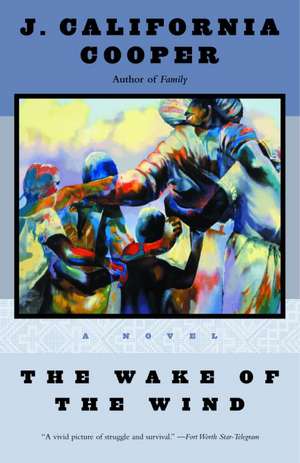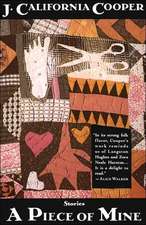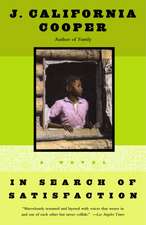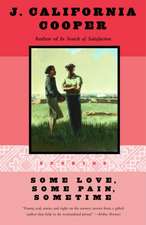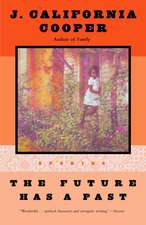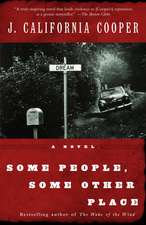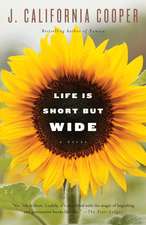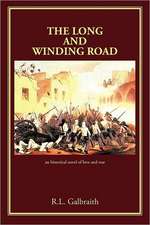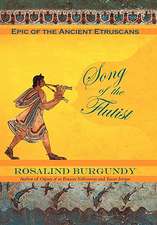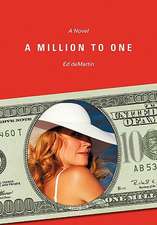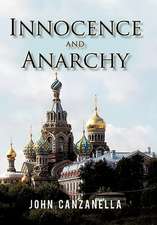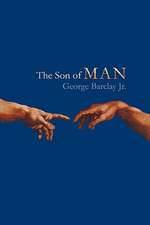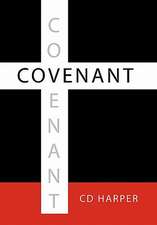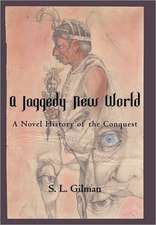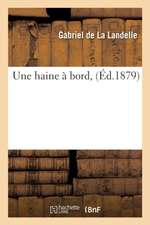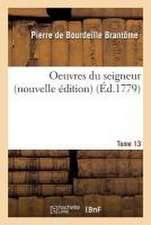The Wake of the Wind
Autor J. California Cooper, California Cooperen Limba Engleză Paperback – 30 noi 1999
The Wake of the Wind, J. California Cooper's third novel, is her most penetrating look yet at the challenges that generations of African Americans have had to overcome in order to carve out a home for themselves and their families. Set in Texas in the waning years of the Civil War, the novel tells the dramatic story of a remarkable heroine, Lifee, and her husband, Mor. When Emancipation finally comes to Texas, Mor, Lifee, and the extended family they create from other slaves who are also looking for a home and a future, set out in search of a piece of land they can call their own. In the face of constant threats, they manage not only to survive but to succeed--their crops grow, their children thrive, they educate themselves and others. Lifee and Mor pass their intelligence, determination, and talents along to their children, the next generation to surge forward. At once tragic and triumphant, this is an epic story that captures with extraordinary authenticity the most important struggle of the last hundred years.
Preț: 90.11 lei
Nou
Puncte Express: 135
Preț estimativ în valută:
17.24€ • 18.07$ • 14.25£
17.24€ • 18.07$ • 14.25£
Carte disponibilă
Livrare economică 22 martie-05 aprilie
Preluare comenzi: 021 569.72.76
Specificații
ISBN-13: 9780385487054
ISBN-10: 0385487053
Pagini: 384
Dimensiuni: 130 x 201 x 23 mm
Greutate: 0.32 kg
Ediția:Anchor Books.
Editura: Anchor Books
ISBN-10: 0385487053
Pagini: 384
Dimensiuni: 130 x 201 x 23 mm
Greutate: 0.32 kg
Ediția:Anchor Books.
Editura: Anchor Books
Notă biografică
J. California Cooper is the author of the novels Family and In Search of Satisfaction and five collections of short stories, including Homemade Love, winner of the 1989 American Book Award, and Some Love, Some Pain, Sometime. She is also the author of severnteen plays and has been honored as Black Playwright of the Year (1978), received the James Baldwin Writing Award (1988), and the Literary Lion Award from the American Librarby Association (1988). She lives in Gualala, California.
Extras
Now and Then
Once upon a certain year, 1764 or so, over 200 years ago, someone in the world requested a number of African longhorn steer and the African men who knew these cattle and could breed and raise them on a foreign soil; the southern states of America.
Later, along a river in Africa where slavecatchers did not usually seek their prey, and where tribes did not sell their people to slavecatchers (a lie made bigger from a kernel of the truth), these cattle and men were sought for. There were two quiet and content villages at least forty miles apart in this area. These two villages did not socialize much, they were working people and only seldom married others from the different tribes. Even so, some of them were related. Some of the cattle herders knew only in passing the herders from the other village. But Suwaibu and Kola knew each other and when they passed each other in the nights, would stop and talk awhile, exchanging knowledge and small gossip. They liked each other; were friends. Kola wanted Suwaibu to meet and love his younger sister; to marry and become part of his family, to exchange knowledge with him. Suwaibu had sneaked one night to peek at the sister; she was beautiful, he liked her and planned to speak to his father and mother.
These villages did not know their young and able people were in danger at that time and so there were no precautions taken along the river against the heartless thieves of life and men.
Suwaibu, sixteen years old, from the upper river, was herding his father's cattle because he loved the beauty of the land and loved being out on it living under the stars and the sun. His father was a merchant and traveled many places even as far East as Egypt and as far North as Timbuktu, to the University of Sankore. Suwaibu, the eldest son, traveled with him sometimes and loved most the Northern lands where the University of Sankore was. His father was a supplier of paper, salt and books to the university and knew some of the learned people there. Suwaibu could read, write and certainly count, as his father could. Because Suwaibu had begged him, his father was making arrangements for Suwaibu to attend the University at some future time when he could spare his son for a while.
Kola, twenty years old and from the middle river, was married with two children. His father was a keeper of livestock, content with his lot in life; he had an excellent wife and a family of many children, plenty to eat and the whole world, it seemed, to roam in at will.
Soon thereafter, these young men, and other cattlemen from both villages, happened to be out at the same time, late one night, to prepare for a cattle drive along the river, were taken by the thieves, along with their livestock. When these stolen men were thrown into the hold of the ship, mixed amongst each other, no one could explain what had happened and even living so close to each other the dialects were not the same and most of them did not always understand each other.
Suwaibu and Kola were shackled together. They were crowded in the hold face to back over the thousands of miles. Smelling the breath and the body odors of the other, lying in their combined urine and waste. Blood and pus from their wounds mixed as it oozed from their bodies. Some of them who could not understand the language of their brother spoke to each other with their eyes and the tone of their moans when conscious. But what was there to say except of terror and pain, fear and loss, which all those in the hold understood from all the others in the hold. You know of these cruel, unwanted voyages, what more to add?
Finally arriving in a town in the Southern United States, they were taken from the ship to holding cells in a rough-hewn building. There were not too many other buildings in this town, but there was this one new, solid, sturdy and strong building where human beings were stocked. Human beings for sale. To become slaves.
Hosed down and scrubbed (Suwaibu losing much of his skin), they were fed at troughs like animals and prodded into cells with dirty, vermin-filled straw on the floors. Some captives had died on the ships, some died at the trough, some died in the cells. Oh! they had died all along the way! Suwaibu and Kola, among others, did not die; they survived to be taken, at last, to the auction block. Suwaibu and Kola were bought, with the remaining cattle that had survived, by different plantation masters. After breathing each other's breath and mixing blood daily for months, they were separated. They were never to see each other again. Suwaibu was taken to Texas; Kola was taken to Mississippi.
They both grieved for their old homes of family and warmth, love and a future. They looked, often, toward what they thought was the direction of their old homes and Gods over long and miserable months as days grew into a blur of time. Their work was long, hard and heavy. In time and finally, in lonely desperation, Kola was forced to take a woman (a wife?) and begin his life, for true, in America. He fathered children that reminded him of his children back in Africa. In his lifetime in America he had three wives (?) and all his children sold away from him. His grief, daily, became too huge and heavy to bear and so he died after fifteen years. He was about thirty-five years old. An old, old young man. His children all sold or dead, he was leaving no one behind him to grieve for him (which men of all nations try to have), only a master who cursed him for dying and said not a good word about Kola or the beautiful cattle roaming his fields that Kola had raised for him. Not even the master's money could buy more slaves that knew how to raise the cattle as Kola had.
The master raged, "These black devils cost too much to just die and leave you! I blive they only do it for meanness, the good-for-nothin black bastards!"
Another female slave had died the day after Kola died. She died giving birth in the sugarcane fields where she should not have been sent to work. She might have survived it anyway and given birth, but the overseer did not believe the child was coming yet and she was whipped, unmercifully in the heat of the afternoon sun for "trying to get out of work," he said. She and the child gave up the ghost, gladly. Kola was thrown in a pit with her and the baby, back to face, and covered with dirt. So Kola was buried in this new country the same way he was brought to it. Back to face, though now, with someone he did not know; a crying, desolate stranger whose dying blood and child still clung to her and now, with him. All uncared for, unwashed, just thrown away.
These kinds of whipping deaths happened so often, the whippers would have been called serial killers or psychopaths, by an honest people, had the words been in use.
Yes, Kola died . . . but he had had children and his blood was still living in this new world of pain. His blood still rushing, striving, pulsing on toward some future.
Suwaibu was living his pitiful life as a slave and he chose to live it alone. For many years he did not want a wife or woman or children, to lose to the vast unknown space beyond his vision. Sold . . . or killed. Many years he dreamed of and longed for his home and family in Africa. Thought of the future he had had before him, the university, his father's commerce. His reading, writing and speaking in four different languages he had learned working with his father did him no good here; they did not recognize there was no "th" sound in his language. They called him ignorant and savage in this country where his Master could not even speak his one language well. He grew to hate his cruel and ignorant masters.
He was not allowed to remain alone, however. Though he was very religious and wanted to maintain his honor to his God, Suwaibu had to be forced on pain of death to father several children. He worked all the days of his life, dying a truly beaten, bent old man, full of hate and rage. He had been beaten many times when they sold his children and even the wife he had grown to care for. He had raged and grieved. They said that was only the savage part of him. "Animals!" they said. From the day he was taken from his home, Africa, he was not happy One day, One hour, for all the days of his life. Not One. Not even when his children were born was he happy, because he knew they were born to be slaves.
When Suwaibu was about fifty years old, grayhaired and almost sightless, for his tears had washed away his sight and the tears of his body, called sweat, had drained his soul. He died, sitting in front of a tired, dilapidated, old shack. Looking, still looking, yearning, toward his old, true home.
When Suwaibu's master was informed of his death by a man Suwaibu had trained to tend the special cattle, the master leaned back in his chair, removed his cigar and spat a piece of tobacco to the side, saying "Well, we can stop wastin that there food he was eatin and doin no work with."
The slave cattleman, who, with most other slaves, respected Suwaibu, said, "We done pared him for buryin, Massr. We knows where to put em. Can we'uns put im away now? Dis here heat . . . gonna make his'n body . . ."
The master spat again and said, "Naw, not now. We got to get them fields in fore the rain sets in." The slave answered, "I can do it, this ebenin. We'uns can dig his grave affa supper, in da dark." The master frowned, "Ya'all ain't tired, huh? If I want you to work, you'd be tired."
The slave bent his head, begging. "He was a fren to all o us."
The master turned back to his glass of bourbon. "Well, get it done quick, cause I don't want no tired niggers lazyin round my cattle tomarra. Now, get on away from me and wastin all my time talkin bout a dead nigga."
"Yessuh Massr." The slave backed down the short steps. "Yessuh."
And Suwaibu was buried in a hastily stolen (they made us steal so much), ragged horse blanket with the tears of his fellow brothers and sisters falling down into his grave. They would miss him. He had shared his food with them, his wood for warmth in the freezing winters. They would miss him.
Though by pain of death, reluctantly, Suwaibu had fathered children. He had seen some beaten, a few die, some sold, but living, because he had taught them the secrets of the Longhorn cattle and they became valuable. Those living children carried his blood out all over the Southern lands of America. His blood was rushing on into the unknown future through the veins of his black children, and their children.
And Then, Again
Forty years after the death of Suwaibu, about 1830, Suwaibu's blood still rushing toward the future, one of his descendants, a great, great, great-grandchild, was born. The child was named Mordecai by another of those religious, yet cruel, masters.
Years later in another place, around 1840, the rushing and descending blood of Kola made an advent in the form of one of his great, great, great-granddaughters. She was born in Louisiana, supposedly a child of the white master and his private concubine-slave, her mother. The baby was named Lifee by a dramatic housemaid, close friend of the mother. "Ah, she has come from such a life; what life will her birth bring to her. We must pray she will not be a slave, nor a fool. That she will find a way to live. Lifee."
Another gift was given to Lifee when she was older, by the close friend of her mother, the old mulatto slave housemaid. It was a small, exquisite enameled box. In it were two daguerreotypes. One of her mother and a stolen one of her true father, an African man. Also in it was the towel used to catch her when she was born with the initial "I" embroidered upon it and a delicate handkerchief in the shape of a heart. It was all she had that she truly treasured. It was all of her heritage.
Lifee had been born to a mulatto mistress and an African man, so she was hastily given away by her mother who knew she was in danger from her master, since he expected his white child. He thought she suffered grief because their child had died, but she suffered because she had to give her child away to one of the women who worked for her, a faithful old Negro woman, Lala. Lala had been freed because she was too old, and less beautiful now, to serve her white lover who wanted a younger woman. He freed her and sat her on the streets with nothing. She had found her sister, also free now, and they lived together, raising the child, in clean squalor.
When Lifee was three years old, the faithful old Lala died and her sister could not afford to keep Lifee. She told Lifee's true mother who then convinced her white master to buy Lifee for his daughter as a gift. It was all the mother could do for her child.
These two people, Mordecai and Lifee, were born hundreds of miles apart physically. Their lives were lived thousands of miles apart mentally because she had learned in a classroom sitting beside her young mistress and he had never held a book in his hands. But they were traveling on the broad, broad map of life and though they seemed to be going on different paths, they were slaves, heading in the same direction leading to one road. In the irony and beauty of life, after one hundred years, the bloods of Kola and Suwaibu were about to meet again through their descendants, Mordecai and Lifee. You never know, exactly, who is carrying your blood. It is now, a lifelong, endless search for relatives. Somebody. Often fruitless for many.
Once upon a certain year, 1764 or so, over 200 years ago, someone in the world requested a number of African longhorn steer and the African men who knew these cattle and could breed and raise them on a foreign soil; the southern states of America.
Later, along a river in Africa where slavecatchers did not usually seek their prey, and where tribes did not sell their people to slavecatchers (a lie made bigger from a kernel of the truth), these cattle and men were sought for. There were two quiet and content villages at least forty miles apart in this area. These two villages did not socialize much, they were working people and only seldom married others from the different tribes. Even so, some of them were related. Some of the cattle herders knew only in passing the herders from the other village. But Suwaibu and Kola knew each other and when they passed each other in the nights, would stop and talk awhile, exchanging knowledge and small gossip. They liked each other; were friends. Kola wanted Suwaibu to meet and love his younger sister; to marry and become part of his family, to exchange knowledge with him. Suwaibu had sneaked one night to peek at the sister; she was beautiful, he liked her and planned to speak to his father and mother.
These villages did not know their young and able people were in danger at that time and so there were no precautions taken along the river against the heartless thieves of life and men.
Suwaibu, sixteen years old, from the upper river, was herding his father's cattle because he loved the beauty of the land and loved being out on it living under the stars and the sun. His father was a merchant and traveled many places even as far East as Egypt and as far North as Timbuktu, to the University of Sankore. Suwaibu, the eldest son, traveled with him sometimes and loved most the Northern lands where the University of Sankore was. His father was a supplier of paper, salt and books to the university and knew some of the learned people there. Suwaibu could read, write and certainly count, as his father could. Because Suwaibu had begged him, his father was making arrangements for Suwaibu to attend the University at some future time when he could spare his son for a while.
Kola, twenty years old and from the middle river, was married with two children. His father was a keeper of livestock, content with his lot in life; he had an excellent wife and a family of many children, plenty to eat and the whole world, it seemed, to roam in at will.
Soon thereafter, these young men, and other cattlemen from both villages, happened to be out at the same time, late one night, to prepare for a cattle drive along the river, were taken by the thieves, along with their livestock. When these stolen men were thrown into the hold of the ship, mixed amongst each other, no one could explain what had happened and even living so close to each other the dialects were not the same and most of them did not always understand each other.
Suwaibu and Kola were shackled together. They were crowded in the hold face to back over the thousands of miles. Smelling the breath and the body odors of the other, lying in their combined urine and waste. Blood and pus from their wounds mixed as it oozed from their bodies. Some of them who could not understand the language of their brother spoke to each other with their eyes and the tone of their moans when conscious. But what was there to say except of terror and pain, fear and loss, which all those in the hold understood from all the others in the hold. You know of these cruel, unwanted voyages, what more to add?
Finally arriving in a town in the Southern United States, they were taken from the ship to holding cells in a rough-hewn building. There were not too many other buildings in this town, but there was this one new, solid, sturdy and strong building where human beings were stocked. Human beings for sale. To become slaves.
Hosed down and scrubbed (Suwaibu losing much of his skin), they were fed at troughs like animals and prodded into cells with dirty, vermin-filled straw on the floors. Some captives had died on the ships, some died at the trough, some died in the cells. Oh! they had died all along the way! Suwaibu and Kola, among others, did not die; they survived to be taken, at last, to the auction block. Suwaibu and Kola were bought, with the remaining cattle that had survived, by different plantation masters. After breathing each other's breath and mixing blood daily for months, they were separated. They were never to see each other again. Suwaibu was taken to Texas; Kola was taken to Mississippi.
They both grieved for their old homes of family and warmth, love and a future. They looked, often, toward what they thought was the direction of their old homes and Gods over long and miserable months as days grew into a blur of time. Their work was long, hard and heavy. In time and finally, in lonely desperation, Kola was forced to take a woman (a wife?) and begin his life, for true, in America. He fathered children that reminded him of his children back in Africa. In his lifetime in America he had three wives (?) and all his children sold away from him. His grief, daily, became too huge and heavy to bear and so he died after fifteen years. He was about thirty-five years old. An old, old young man. His children all sold or dead, he was leaving no one behind him to grieve for him (which men of all nations try to have), only a master who cursed him for dying and said not a good word about Kola or the beautiful cattle roaming his fields that Kola had raised for him. Not even the master's money could buy more slaves that knew how to raise the cattle as Kola had.
The master raged, "These black devils cost too much to just die and leave you! I blive they only do it for meanness, the good-for-nothin black bastards!"
Another female slave had died the day after Kola died. She died giving birth in the sugarcane fields where she should not have been sent to work. She might have survived it anyway and given birth, but the overseer did not believe the child was coming yet and she was whipped, unmercifully in the heat of the afternoon sun for "trying to get out of work," he said. She and the child gave up the ghost, gladly. Kola was thrown in a pit with her and the baby, back to face, and covered with dirt. So Kola was buried in this new country the same way he was brought to it. Back to face, though now, with someone he did not know; a crying, desolate stranger whose dying blood and child still clung to her and now, with him. All uncared for, unwashed, just thrown away.
These kinds of whipping deaths happened so often, the whippers would have been called serial killers or psychopaths, by an honest people, had the words been in use.
Yes, Kola died . . . but he had had children and his blood was still living in this new world of pain. His blood still rushing, striving, pulsing on toward some future.
Suwaibu was living his pitiful life as a slave and he chose to live it alone. For many years he did not want a wife or woman or children, to lose to the vast unknown space beyond his vision. Sold . . . or killed. Many years he dreamed of and longed for his home and family in Africa. Thought of the future he had had before him, the university, his father's commerce. His reading, writing and speaking in four different languages he had learned working with his father did him no good here; they did not recognize there was no "th" sound in his language. They called him ignorant and savage in this country where his Master could not even speak his one language well. He grew to hate his cruel and ignorant masters.
He was not allowed to remain alone, however. Though he was very religious and wanted to maintain his honor to his God, Suwaibu had to be forced on pain of death to father several children. He worked all the days of his life, dying a truly beaten, bent old man, full of hate and rage. He had been beaten many times when they sold his children and even the wife he had grown to care for. He had raged and grieved. They said that was only the savage part of him. "Animals!" they said. From the day he was taken from his home, Africa, he was not happy One day, One hour, for all the days of his life. Not One. Not even when his children were born was he happy, because he knew they were born to be slaves.
When Suwaibu was about fifty years old, grayhaired and almost sightless, for his tears had washed away his sight and the tears of his body, called sweat, had drained his soul. He died, sitting in front of a tired, dilapidated, old shack. Looking, still looking, yearning, toward his old, true home.
When Suwaibu's master was informed of his death by a man Suwaibu had trained to tend the special cattle, the master leaned back in his chair, removed his cigar and spat a piece of tobacco to the side, saying "Well, we can stop wastin that there food he was eatin and doin no work with."
The slave cattleman, who, with most other slaves, respected Suwaibu, said, "We done pared him for buryin, Massr. We knows where to put em. Can we'uns put im away now? Dis here heat . . . gonna make his'n body . . ."
The master spat again and said, "Naw, not now. We got to get them fields in fore the rain sets in." The slave answered, "I can do it, this ebenin. We'uns can dig his grave affa supper, in da dark." The master frowned, "Ya'all ain't tired, huh? If I want you to work, you'd be tired."
The slave bent his head, begging. "He was a fren to all o us."
The master turned back to his glass of bourbon. "Well, get it done quick, cause I don't want no tired niggers lazyin round my cattle tomarra. Now, get on away from me and wastin all my time talkin bout a dead nigga."
"Yessuh Massr." The slave backed down the short steps. "Yessuh."
And Suwaibu was buried in a hastily stolen (they made us steal so much), ragged horse blanket with the tears of his fellow brothers and sisters falling down into his grave. They would miss him. He had shared his food with them, his wood for warmth in the freezing winters. They would miss him.
Though by pain of death, reluctantly, Suwaibu had fathered children. He had seen some beaten, a few die, some sold, but living, because he had taught them the secrets of the Longhorn cattle and they became valuable. Those living children carried his blood out all over the Southern lands of America. His blood was rushing on into the unknown future through the veins of his black children, and their children.
And Then, Again
Forty years after the death of Suwaibu, about 1830, Suwaibu's blood still rushing toward the future, one of his descendants, a great, great, great-grandchild, was born. The child was named Mordecai by another of those religious, yet cruel, masters.
Years later in another place, around 1840, the rushing and descending blood of Kola made an advent in the form of one of his great, great, great-granddaughters. She was born in Louisiana, supposedly a child of the white master and his private concubine-slave, her mother. The baby was named Lifee by a dramatic housemaid, close friend of the mother. "Ah, she has come from such a life; what life will her birth bring to her. We must pray she will not be a slave, nor a fool. That she will find a way to live. Lifee."
Another gift was given to Lifee when she was older, by the close friend of her mother, the old mulatto slave housemaid. It was a small, exquisite enameled box. In it were two daguerreotypes. One of her mother and a stolen one of her true father, an African man. Also in it was the towel used to catch her when she was born with the initial "I" embroidered upon it and a delicate handkerchief in the shape of a heart. It was all she had that she truly treasured. It was all of her heritage.
Lifee had been born to a mulatto mistress and an African man, so she was hastily given away by her mother who knew she was in danger from her master, since he expected his white child. He thought she suffered grief because their child had died, but she suffered because she had to give her child away to one of the women who worked for her, a faithful old Negro woman, Lala. Lala had been freed because she was too old, and less beautiful now, to serve her white lover who wanted a younger woman. He freed her and sat her on the streets with nothing. She had found her sister, also free now, and they lived together, raising the child, in clean squalor.
When Lifee was three years old, the faithful old Lala died and her sister could not afford to keep Lifee. She told Lifee's true mother who then convinced her white master to buy Lifee for his daughter as a gift. It was all the mother could do for her child.
These two people, Mordecai and Lifee, were born hundreds of miles apart physically. Their lives were lived thousands of miles apart mentally because she had learned in a classroom sitting beside her young mistress and he had never held a book in his hands. But they were traveling on the broad, broad map of life and though they seemed to be going on different paths, they were slaves, heading in the same direction leading to one road. In the irony and beauty of life, after one hundred years, the bloods of Kola and Suwaibu were about to meet again through their descendants, Mordecai and Lifee. You never know, exactly, who is carrying your blood. It is now, a lifelong, endless search for relatives. Somebody. Often fruitless for many.
Recenzii
"A vivid picture of struggle and survival."
--Fort Worth Star-Telegram
"Rendered with compassion and beautiful simplicity."
--The Washington Post Book World
"Heartwarming....Cooper knows the cadences of folktale well."
--Chicago Tribune
"[A] provocative and at times painful family portrait....It should be required reading."
--Detroit Free Press
--Fort Worth Star-Telegram
"Rendered with compassion and beautiful simplicity."
--The Washington Post Book World
"Heartwarming....Cooper knows the cadences of folktale well."
--Chicago Tribune
"[A] provocative and at times painful family portrait....It should be required reading."
--Detroit Free Press
Descriere
Set in Texas during the waning years of the Civil War, this epic novel tells the dramatic story of a remarkable heroine, Lifee, and her husband, Mor, two former slaves who carve out a home for themselves and their family.
